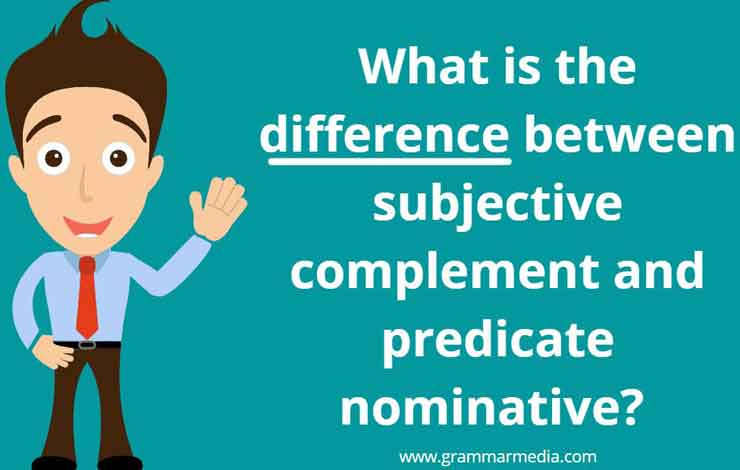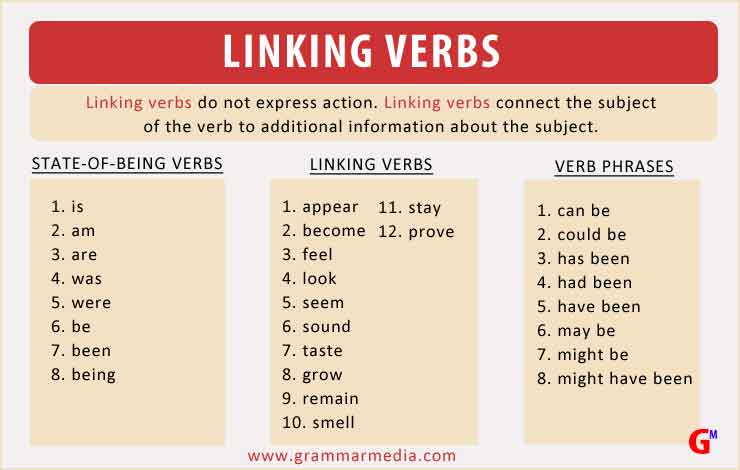There is no difference between subject complement and predicate nominative because the term subject complement is a broad term that includes both predicate nominative and predicate adjective.
Predicate nominatives and predicate adjectives function as subject complements. Let me explain this in the following article.

1. Subject Complement Meaning With Examples
Every sentence has a subject and predicate. Without the predicate, the sentence is not complete.
Complement means to complete. The subject complement completes the sentence in the predicate by renaming the subject (predicate nominative) or describing the subject (predicate adjective).
Now let’s look at the meanings of these three terms.
- The subject complement either renames the subject or describes the subject.
- The predicate nominative renames the subject. The predicate nomination is either a noun or pronoun.
- The predicate adjective describes the subject. The predicate adjective is an adjective.
NOTE: The predicate nominative and the predicate adjective complete the meaning of a state-of-being verb or linking verb. In other words, the subject complement (either predicate nominative or adjective) only follows linking verbs or state-of-being verbs. See the list of linking verbs below!

Let’s look at some examples in order to see these three terms in action.
2. What are some examples of subject complement?
REMEMBER: Subject complement renames the subject of the sentence or describes the subject of the sentence and it follows a linking verb or state-of-being verb.
- David is the teacher.
“David” is the subject of the sentence and “the teacher” (linking verb + noun) complements the subject in the predicate by renaming the subject.
- Peter is smart.
“Peter” is the subject of the sentence and “is smart” (linking verb + adjective) complements the subject in the predicate by describing the subject.
- Jennifer is the captain.
“Jennifer” is the subject of the sentence and “the captain” (linking verb + noun) complements the subject in the predicate by renaming the subject.
- Candice is pretty.
“Candice” is the subject of the sentence and “is pretty” (linking verb + adjective) complements the subject in the predicate by describing the subject.
3. What are some examples of predicate nominative?
REMEMBER: Predicate nominative rename the subject of the sentence. A predicate nominative is either a noun or pronoun and it follows a linking verb or state-of-being verb.
- Sandie is a dentist.
“Sandie” is the subject of the sentence and “is a dentist” (linking verb + noun) complements the subject in the predicate by renaming the subject.
- Jonathan is a builder.
“Jonathan” is the subject of the sentence and “is a builder” (linking verb + noun) complements the subject in the predicate by renaming the subject.
- Rachel is a girl.
“Rachel” is the subject of the sentence and “is a girl” (linking verb + noun) complements the subject in the predicate by renaming the subject.
- Penny is a doctor.
“Penny” is the subject of the sentence and “is a doctor” (linking verb + noun) complements the subject in the predicate by renaming the subject.
4. What are some examples of predicate adjectives?
REMEMBER: Predicate adjectives describe the subject of the sentence. A predicate adjective is an adjective and it follows a linking verb or state-of-being verb.
- Rebekah is beautiful.
“Rebekah” is the subject of the sentence and “is beautiful” (linking verb + adjective) complements the subject in the predicate by describing the subject.
- James is weary.
“James” is the subject of the sentence and “is weary” (linking verb + adjective) complements the subject in the predicate by describing the subject.
- Mary is lazy.
“Mary” is the subject of the sentence and “is lazy” (linking verb + adjective) complements the subject in the predicate by describing the subject.
- Jenny is petite.
“Jenny” is the subject of the sentence and “is petite” (linking verb + adjective) complements the subject in the predicate by describing the subject.
5. How do we find the subject complement in a sentence?
We find the subject complement in the predicate of the sentence, which can be either a predicate nominative (renaming the subject) or predicate adjective (describing the subject). The subject complement follows a linking verb and completes the sentence. (See the List of Linking Verbs Above)
Let’s look at some examples using the linking verb list above!
- David appeared polite in light of the hostile environment.
“David” is the subject of the sentence and “appeared” is a linking verb and “polite” is an adjective because it describes something about David. He was polite. Therefore, the subject complement is a predicate adjective.
- Rebekah became the teacher of the dance class.
“Rebekah” is the subject of the sentence and “became” is a linking verb and “teacher” is a noun because it renames Rebekah. She is the teacher. Therefore, the subject complement is a predicate nominative.
- Candice can be lazy at work.
“Candice” is the subject of the sentence and “can be” is a linking verb (verb phrase) and “lazy” is an adjective because it describes something about Candice. She is lazy. Therefore, the subject complement is a predicate adjective.
- Jenny might have been a worker at the factory.
“Jenny” is the subject of the sentence and “might have been” is a linking verb (verb phrase) and “worker” is a noun because it renames Jenny. She is a worker. Therefore, the subject complement is a predicate nominative.
6. How do we test for linking verbs?
Some linking verbs can be used as action verbs. It is important to be able to recognize the difference between action verbs and linking verbs.
Let’s test the following linking verbs to see if they link or show action (some linking verbs can be tricky!).
- Candice smelled the roses in the garden.
- Elizabeth smelled attractive with the new perfume.
In the first sentence, “Candice” is the subject of the sentence but “smelled” is an action word. It tells us that Candice performed an action. She smelled the roses. It doesn’t describe Candice or rename Candice.
In the second sentence, “Elizabeth” is the subject of the sentence and “smelled” is a linking verb and “attractive” is an adjective because it describes something about Elizabeth. She is attractive. Therefore, the subject complement is a predicate adjective.
- David appeared troubled with the doctor’s advice.
- Emma appeared onstage at her graduation.
In the first sentence, “David” is the subject of the sentence and “appeared” is a linking verb and “troubled” is an adjective because it describes something about David. He is troubled. Therefore, the subject complement is a predicate adjective.
In the second sentence, “Emma” is the subject of the sentence but “appeared” is an action word. It tells us that Emma performed an action. She appeared onstage. It doesn’t describe Emma or rename Emma.
We can also test for linking verbs by replacing linking verbs with a state-of-being verb, such as, am, is, was, were. Let’s look at an example:
- She seems attractive in the new dress.
- She is attractive in the new dress. (correct)
- She smelled the roses in the garden.
- She is the roses in the garden. (incorrect)
In the first example, “seems” can be replaced by “is” and therefore “seems” is a linking verb.
In the second example, “smelled” cannot be replaced by “is” and therefore “smelled” is not acting as a linking verb.
7. Subject Complement Quiz!
Check to see if the subject complement is a predicate nominative or predicate adjective! See the answers below!
- Jonathan was sleepy during the movie.
- Victoria became the captain of the football team.
- David seemed anxious in the doctor’s surgery.
- She is the hero of our class.
- He was silly at the party.
- All seemed normal before the vicious storm.
- He remained calm during the debate.
- He looked agitated during the interview.
- Rachel was the champion of her sport’s team.
- She was insightful with her explanation.

8. The Answers To The Subject Complement Quiz
- Predicate Adjective
- Predicate Nominative
- Predicate Adjective
- Predicate Nominative
- Predicate Adjective
- Predicate Adjective
- Predicate Adjective
- Predicate Adjective
- Predicate Nominative
- Predicate Adjective